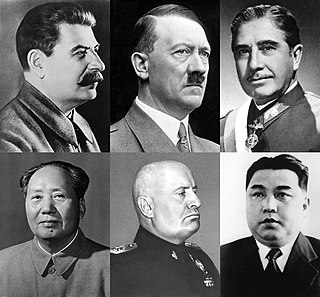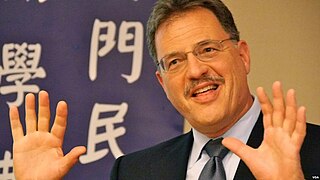Related Research Articles

A dictator is a political leader who possesses absolute power. A dictatorship is a state ruled by one dictator or by a polity. The word originated as the title of a Roman dictator elected by the Roman Senate to rule the republic in times of emergency. Like the terms tyrant and autocrat, dictator came to be used almost exclusively as a non-titular term for oppressive rule. In modern usage the term dictator is generally used to describe a leader who holds or abuses an extraordinary amount of personal power.
In China, politics functions within a communist state framework based on the system of people's congress under the leadership of the Chinese Communist Party (CCP), with the National People's Congress (NPC) functioning as the highest organ of state power and only branch of government per the principle of unified power. The CCP leads state activities by holding two-thirds of the seats in the NPC, and these party members are, in accordance with democratic centralism, responsible for implementing the policies adopted by the CCP Central Committee and the National Congress. The NPC has unlimited state power bar the limitations it sets on itself. By controlling the NPC, the CCP has complete state power. China's two special administrative regions (SARs), Hong Kong and Macau, are nominally autonomous from this system.
A one-party state, single-party state, one-party system or single-party system is a governance structure in which only a single political party controls the ruling system. In a one-party state, all opposition parties are either outlawed or enjoy limited and controlled participation in elections. The term "de facto one-party state" is sometimes used to describe a dominant-party system that, unlike a one-party state, allows multiparty elections, but the existing practices or balance of political power effectively prevent the opposition from winning power.

The End of History and the Last Man is a 1992 book of political philosophy by American political scientist Francis Fukuyama which argues that with the ascendancy of Western liberal democracy—which occurred after the Cold War (1945–1991) and the dissolution of the Soviet Union (1991)—humanity has reached "not just ... the passing of a particular period of post-war history, but the end of history as such: That is, the end-point of mankind's ideological evolution and the universalization of Western liberal democracy as the final form of human government."
China censors both the publishing and viewing of online material. Many controversial events are censored from news coverage, preventing many Chinese citizens from knowing about the actions of their government, and severely restricting freedom of the press. China's censorship includes the complete blockage of various websites, apps, and video games, inspiring the policy's nickname, the Great Firewall of China, which blocks websites. Methods used to block websites and pages include DNS spoofing, blocking access to IP addresses, analyzing and filtering URLs, packet inspection, and resetting connections.
In political science, a political system means the form of political organization that can be observed, recognised or otherwise declared by a society or state.

Democratization, or democratisation, is the structural government transition from an authoritarian government to a more democratic political regime, including substantive political changes moving in a democratic direction.
The term "illiberal democracy" describes a governing system that hides its "nondemocratic practices behind formally democratic institutions and procedures". There is a lack of consensus among experts about the exact definition of illiberal democracy or whether it even exists.
Elections in the People's Republic of China occur under a one-party authoritarian political system controlled by the Chinese Communist Party (CCP). Direct elections, except in the special administrative regions of Hong Kong and Macau, occur only at the local level people's congresses and village committees, with all candidate nominations preapproved by the CCP. By law, all elections at all levels must adhere to the leadership of the CCP.

In politics, a strongman is a type of authoritarian political leader—civilian or military—who exerts control through military enforcement and has, or has claimed to have, strong popular support. Strongmen typically claim to have widespread popular support, portray themselves as the only one capable of solving the country's problems, and espouse a disdain for liberalism and democracy.

Larry Jay Diamond is an American political sociologist and leading contemporary scholar in the field of democracy studies. Diamond is a senior fellow at the Freeman Spogli Institute for International Studies, Stanford University's main center for research on international issues. At the Institute Diamond served as the director of the Center on Democracy, Development, and the Rule of Law from 2009-2016. He was succeeded in that role by Francis Fukuyama and then Kathryn Stoner.
Censorship in the People's Republic of China (PRC) is mandated by the country's ruling party, the Chinese Communist Party (CCP). It is one of the strictest censorship regimes in the world. The government censors content for mainly political reasons, such as curtailing political opposition, and censoring events unfavorable to the CCP, such as the 1989 Tiananmen Square protests and massacre, pro-democracy movements in China, the persecution of Uyghurs in China, human rights in Tibet, Falun Gong, pro-democracy protests in Hong Kong, and aspects of the COVID-19 pandemic. Since Xi Jinping became the general secretary of the Chinese Communist Party in 2012, censorship has been "significantly stepped up".
The Goldsmith Book Prize is a literary award for books published in the United States.

Guillermo Alberto O'Donnell Ure was a prominent Argentine political scientist who specialized in comparative politics and Latin American politics. He spent most of his career working in Argentina and the United States, and who made lasting contributions to theorizing on authoritarianism and democratization, democracy and the state, and the politics of Latin America. His brother is Pacho O'Donnell.
Authoritarianism is a political system characterized by the rejection of political plurality, the use of strong central power to preserve the political status quo, and reductions in democracy, separation of powers, civil liberties, and the rule of law. Political scientists have created typologies describing variations of authoritarian forms of government. Authoritarian regimes may be either autocratic or oligarchic and may be based upon the rule of a party or the military. States that have a blurred boundary between democracy and authoritarianism have some times been characterized as "hybrid democracies", "hybrid regimes" or "competitive authoritarian" states.

Danielle Susan Allen is an American classicist and political scientist. She is the James Bryant Conant University Professor at Harvard University. She is also the former Director of the Edmond & Lily Safra Center for Ethics at Harvard University.
Mark R. Thompson is an academic whose comparative politics research focuses on Southeast Asia, with particular interest in the Philippines, Singapore, and Thailand. He is currently studying autocratization and opposition to it, presidentialism, and dynastic leadership. He is chair professor of politics in the Department of Public and International Affairs at the City University of Hong Kong, where he is also director of the Southeast Asia Research Centre (SEARC).

Democratic backsliding is a process of regime change toward autocracy in which the exercise of political power becomes more arbitrary and repressive. The process typically restricts the space for public contest and political participation in the process of government selection. Democratic decline involves the weakening of democratic institutions, such as the peaceful transition of power or free and fair elections, or the violation of individual rights that underpin democracies, especially freedom of expression. Democratic backsliding is the opposite of democratization.
Mary E. Gallagher is an American political scientist. She is currently the Marilyn Keough Dean of the University of Notre Dame's Keough School of Global Affairs and a nonresident senior fellow at the Brookings Institution's John L. Thornton China Center.
References
- ↑ "Margaret Roberts". china.ucsd.edu. Retrieved 2024-12-15.
- ↑ "Faculty Endowed Chairs". chancellorsassociates.ucsd.edu. Retrieved 2024-12-15.
- ↑ Farrell, Henry (October 1, 2018). "China is weaponizing online distraction". Washington Post . Archived from the original on May 6, 2020. Retrieved December 15, 2024.
- ↑ Liu, Yi-Ling. "In China, GitHub Is a Free Speech Zone for Covid Information". Wired. ISSN 1059-1028 . Retrieved 2024-12-15.
- ↑ Kennedy, Merrit (May 22, 2016). "Study: China's Government Fabricates About 488 Million Social Media Posts Every Year". National Public Radio . Retrieved December 15, 2024.
- ↑ "Margaret E. Roberts". polisci.ucsd.edu. Retrieved 2024-12-15.
- ↑ "Censored | Princeton University Press". press.princeton.edu. 2018-04-10. Retrieved 2024-12-15.
- ↑ "The Authoritarian Data Problem". Journal of Democracy. Retrieved 2024-12-15.